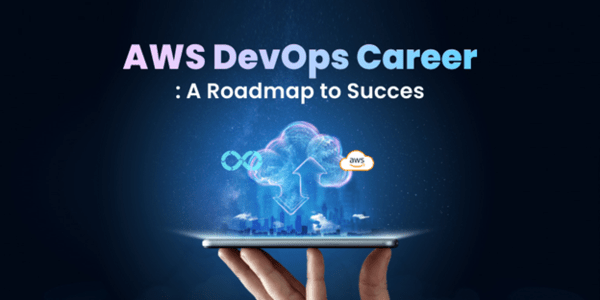AWS DevOps Career: A Roadmap to Success
DevOps is an important and growing field that combines development and operations. As more companies move to the cloud, the demand for AWS DevOps engineers is increasing rapidly. Below we will outline a roadmap for building a successful career in AWS DevOps.
The first step is learning the fundamentals through an AWS DevOps Training. This will teach you the key AWS services like EC2, S3, and RDS, and how to automate infrastructure provisioning and application deployments using tools like Ansible, Terraform, and AWS CodeDeploy.
Following a course with hands-on projects is a great way to gain the skills needed to start your AWS DevOps journey.

Table of Contents:
- Introduction to DevOps and AWS
- Understanding the Role of a DevOps Engineer
- Essential Skills and Knowledge for AWS DevOps
- AWS Certifications for DevOps Professionals
- Building Your AWS DevOps Toolkit
- Implementing DevOps Practices on AWS
- Best Practices for AWS DevOps Security
- Real-world Applications and Case Studies
- Advancing Your Career in AWS DevOps
- Conclusion: Navigating Your Path to Success
Introduction to DevOps and AWS
DevOps is a set of practices that combines software development (Dev) and IT operations (Ops) which helps in building, testing, and releasing software faster and more reliably. Amazon Web Services (AWS) is a cloud computing platform that offers infrastructure as a service to individuals, companies, and governments and supports DevOps practices through its services. In this blog, we will look at how one can build a successful career in AWS DevOps.
Understanding the Role of a DevOps Engineer
A DevOps engineer is responsible for automating the processes between software development and IT teams so that they can build, test, and release software faster and more reliably. Some key responsibilities of a DevOps engineer include:
- Automating infrastructure provisioning, application deployment, testing and monitoring using configuration management, continuous integration, and continuous delivery tools.
- Ensuring high availability, scalability, and reliability of applications by implementing monitoring, alerting and auto-scaling strategies.
- Troubleshooting issues, reviewing logs to identify bottlenecks and optimize application performance.
- Implementing security best practices, access management and regulatory compliance.
- Collaborating with development and operations teams to streamline workflows and processes.
Essential Skills and Knowledge for AWS DevOps
To succeed as an AWS DevOps engineer, one needs to have skills in configuration management tools like Ansible, Chef, Puppet; continuous integration and delivery tools like Jenkins, GitLab CI/CD; containerization technologies like Docker and Kubernetes; programming languages like Python, JavaScript, Go etc. One also needs to have hands-on experience of AWS services like EC2, S3, RDS, Lambda, ECS, EKS, CodePipeline, CodeBuild, CodeDeploy etc. A solid understanding of DevOps principles, site reliability engineering, infrastructure as code, microservices architecture, monitoring and observability is also essential.
AWS Certifications for DevOps Professionals
Getting AWS certifications is a great way to validate your skills and knowledge to employers. Some popular AWS certifications for DevOps professionals include:
- AWS Certified Cloud Practitioner: Validates basic knowledge of AWS services.
- AWS Certified Solutions Architect – Associate: Focuses on ability to design distributed applications and systems on AWS.
- AWS Certified DevOps Engineer – Professional: Validates ability to develop and manage AWS applications using automated practices.
- AWS Certified Advanced Networking – Specialty: Targeted towards networking professionals working with AWS.
- AWS Certified Security – Specialty: Validates skills in securing AWS workloads and managing security operations.
Building Your AWS DevOps Toolkit
To effectively implement DevOps practices on AWS, one needs to build a robust toolkit. Some important tools to consider include:
- Configuration Management: Ansible, Chef, Puppet
- CI/CD: Jenkins, GitLab, GitHub Actions, CodePipeline, CodeBuild
- Containerization: Docker, Kubernetes, ECS, EKS
- Infrastructure as Code: CloudFormation, Terraform
- Monitoring and Observability: CloudWatch, CloudTrail, X-Ray, Grafana, Prometheus
- Collaboration and Communication: Slack with integrations, Jira
- Source Control: Git, CodeCommit
Implementing DevOps Practices on AWS
Some key DevOps practices one can implement on AWS include:
- Infrastructure as Code using CloudFormation templates for provisioning and managing AWS resources.
- Immutable infrastructure approach using automation and versioning to deploy changes.
- Continuous Integration using CodePipeline to build, test and deploy code changes automatically.
- Continuous Delivery using CodeDeploy for automated code deployments to EC2, Lambda, ECS and EKS environments.
- Monitoring and Alerting using CloudWatch for metrics and logs with notifications on SNS.
- Auto-scaling using Auto Scaling Groups for dynamic scaling of EC2 instances and ECS services.
- Canary Deployments using CodeDeploy and traffic shifting to Route53 for safer releases.
- A/B Testing using features like Lambda@Edge and CloudFront to experiment with changes.
Best Practices for AWS DevOps Security
As security is a top priority, some security best practices to follow include:
- Implement least privilege access model using IAM roles for users and services.
- Use AWS WAF and CloudFront for web application firewall and DDoS protection.
- Enable CloudTrail logging for auditing API calls and user activities.
- Use AWS Config for inventory, configuration changes and compliance checks.
- Implement monitoring and alerting using GuardDuty and Macie for threats and data leaks.
- Use encryption (KMS, EBS, S3) and key rotation best practices for data protection.
- Conduct regular vulnerability assessments, security audits, and Cloud Penetration Testing to proactively identify and address potential security risks in your cloud environment.
- Implement disaster recovery, backup and restore strategies using services like EBS Snapshots.
Real-world Applications and Case Studies
Many companies have successfully adopted AWS DevOps practices. For example:
- Netflix migrated to AWS and uses tools like Spinnaker for continuous delivery of video streaming platform.
- Capital One uses AWS, Docker, Kubernetes, and Jenkins for agile development of banking applications.
- The New York Times migrated to AWS and uses services like ECS, Lambda, and CloudFront to deliver news content globally.
- Nordstrom uses AWS, Terraform, and Ansible to deploy microservices architecture for its online shopping platform.
Advancing Your Career in AWS DevOps
To advance your career in AWS DevOps, focus on:
- Gaining hands-on experience by taking up side projects that use AWS services.
- Earning more AWS certifications to validate skills and knowledge over time.
- Contributing to open source projects related to DevOps, AWS, containers etc.
- Networking in local user groups and communities and online via blogs, forums, Twitter etc.
- Keep learning new technologies, tools, and AWS services as they emerge and evolve.
- Consider specializing in a particular domain like security, big data, machine learning etc. on AWS.
- Take on leadership roles by mentoring junior engineers, leading initiatives within teams.
Conclusion:
Navigating Your Path to Success AWS DevOps is a fast growing and in-demand career path. With the right skills, certifications, experience and continuous learning; one can have an impactful and successful career in this domain. The opportunities are immense to innovate, automate workflows and deliver applications at scale on AWS. I hope this blog provided useful insights and guidance on how to navigate your path to success in AWS DevOps.





